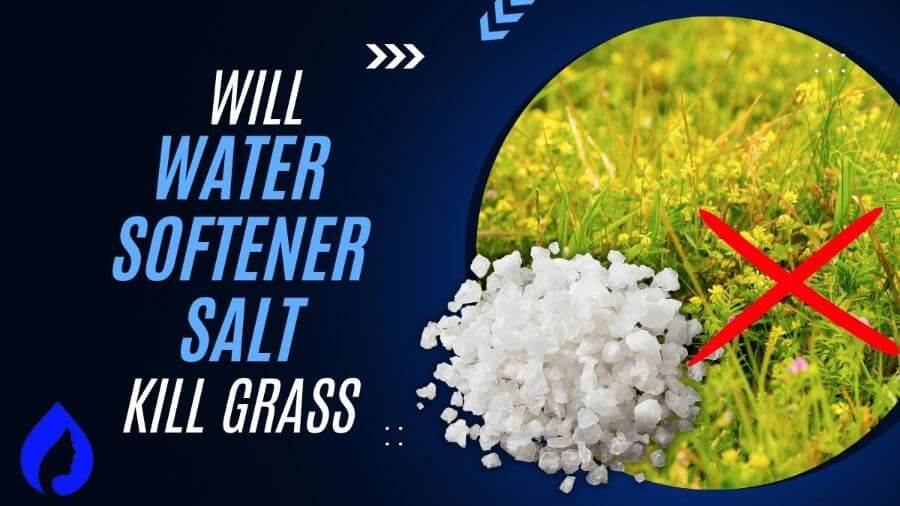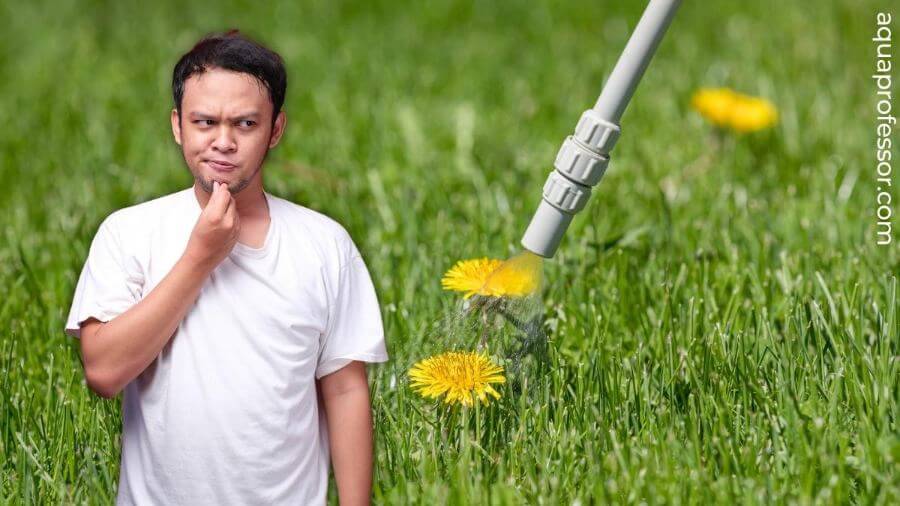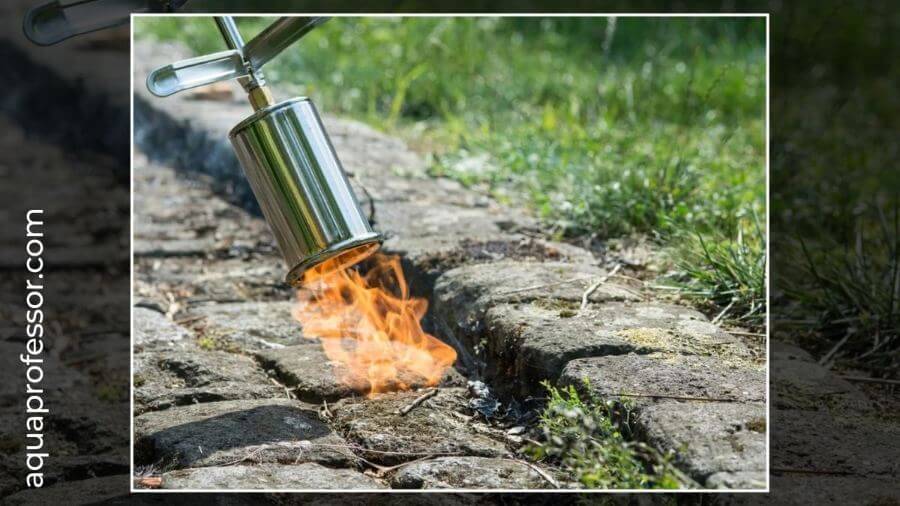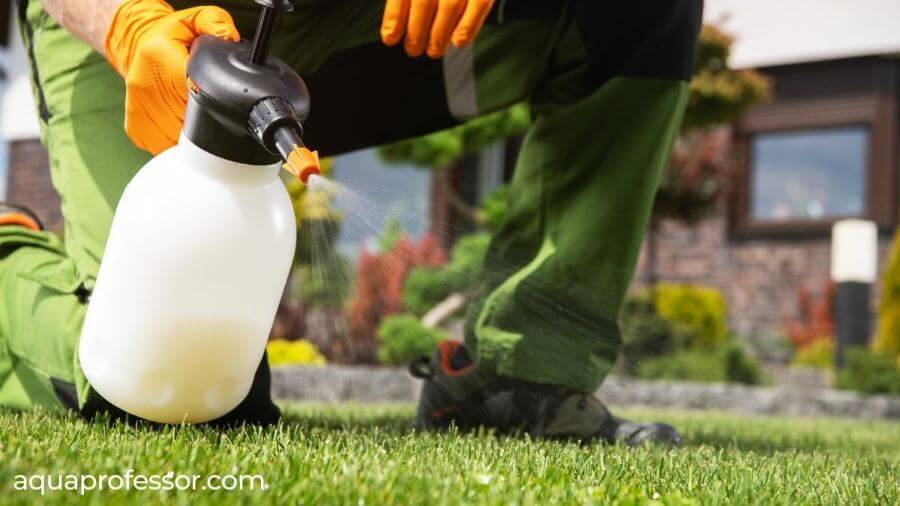
Water softener salt, or salt of any kind, can kill the stubborn grass in your yard.
But it’s not ideal, as it can pollute the soil and groundwater and hinder healthy plant growth.
So, better use these alternative options:
Continue reading for a detailed guide on whether water softener salt can kill grass and whether you should use it for weed control.
🧂Does Water Softener Salt Kill Grass And Weeds?

Salt kills grass and weeds by absorbing water and displacing nutrients, disrupting the plant’s internal system.
But salts aren’t selective killers and affect other plants and trees the same way as weeds. That makes salts the worst choice as an herbicide.
Here are some other effects of using salt to kill weeds and grass:
Due to the above factors, salt isn’t a safe option to remove weeds.
Also Read: Can You Use Water Softener Salt To Melt Ice?
🤔How To Kill Grass and Weeds Without Using Water Softener Salt?
Dealing with weeds can be a constant battle. But salt isn’t the only choice to free your beautiful garden or yard from weeds. Here are the better alternatives to preserve the quality of your lawn:
1️⃣ Using Glyphosate

Glyphosate is a non-selective herbicide. And it can help you achieve a weed-free lawn for an extended period.
Note: This method affects soil as well. Hence it is no better than softener salt and should be avoided in the long-run.
Applying glyphosate wipes out your protective soil microorganisms, leaving it open to the proliferation of pathogenic organisms (disease).
Also, it is best to get rid of broad-leaf plants and weeds.
Cautions:
How to Apply?
Also Read: Safest Way To Discharge Water Softener Backwash
2️⃣ Using organic weed killers:
Citrus or low-concentration vinegar-based weed killers are environment-friendly solutions to weed issues. It doesn’t harm the groundwater and is safe for snails and earthworms as long as we use lower concentrations.
How to Use It?
3️⃣ Use solarization
Solarization is an organic way to kill weeds and grass in your vegetation field. Here, you use a clear plastic tarp to heat the ground with abundant sunlight.
It creates a greenhouse effect and kills unwanted weeds.
How to Apply?
Also Read: How To Remove Sodium From Softened Water
4️⃣ Use Flame Weeding

Flame weeding uses a propane torch or some other fuel-burning device. Here, we use heated flames to kill unwanted plants in the garden.
Flame weeding is best to remove young, actively growing, broad-leaf weeds rather than grass.
Caution:
Use this technique on your driveway, patio, or a smaller patch. And try to avoid areas near your healthy, green, desirable plants.
How to Apply?
5️⃣ Pull Weeds by Hand
Pulling weeds by hand can be laborious when you have a large garden area, and the roots deeply penetrate the soil.
Yet, it’s an inexpensive and natural way to get rid of those pesky weeds.
How to Proceed?
Combine a few of these methods to get the most benefit.
Also Read: Can You Use Pool Salt In Water Softener?
🎯How To Use Water Softener Salt To Kill Weeds Anyway?

If you want to accept the salting risk and use water softener salt anyway, ensure you don’t add excessively. Here are the safest methods to use water softener salt:
👉Method 1
👉Method 2
👉Method 3
Also Read: Best Water Softener Salt
💡Will Water Softener Salt Kill Grass: FAQs
Will water softener salt kill plants and trees?
Water softener salt will kill plants and trees by sucking the water from the soil and creating a water and nutrient scarcity condition.
Does salt-softened water kill plants?
Yes, salt-softened water from softeners containing sodium or potassium can kill your garden plants through dehydration.
A high amount of salt can imbalance the water inside the plant’s cells, and the plant wilts.
Is water softener discharge bad for plants?
Absolutely. Water softener discharge from the softeners contains a high amount of exchanged calcium and magnesium from the hard water.
Besides, some sodium salt is left behind in the brine tank that the ion exchanger couldn’t take.
The disposed minerals after the conversion of hard water into soft water can kill the grass and other plants, like salt water.
The sodium in discharged water alters the soil pH, dehydrates the root cells, and competes with the soil’s essential nutrients. This results in disrupted physiology, and gradually, the crops die.
How do I make my water softener water safe for plants?
You can reverse the effect of salt-treated water on your plant. Here are a few methods:
1. Install a bypass valve and get untreated water for watering activities.
2. Switch from sodium water softener salt to potassium.
3. Use a reverse osmosis (RO) filter to treat your softened water further and remove sodium and other minerals.
What type of salt is best for killing weeds?
Regular iodized or non-iodized table salt or rock salt (sodium chloride) is the most efficient solution to kill weeds.
Before purchasing a salt for weeds, check the label to know the composition of the salt.
Adarsh is a Health & Nutrition Sciences graduate with expertise in environmental health. He is associated with ventures like Glacier Fresh Filter and Simpure Filter Systems. Through Aqua Professor, he intends to provide helpful information to every home to help them make smarter decisions.
